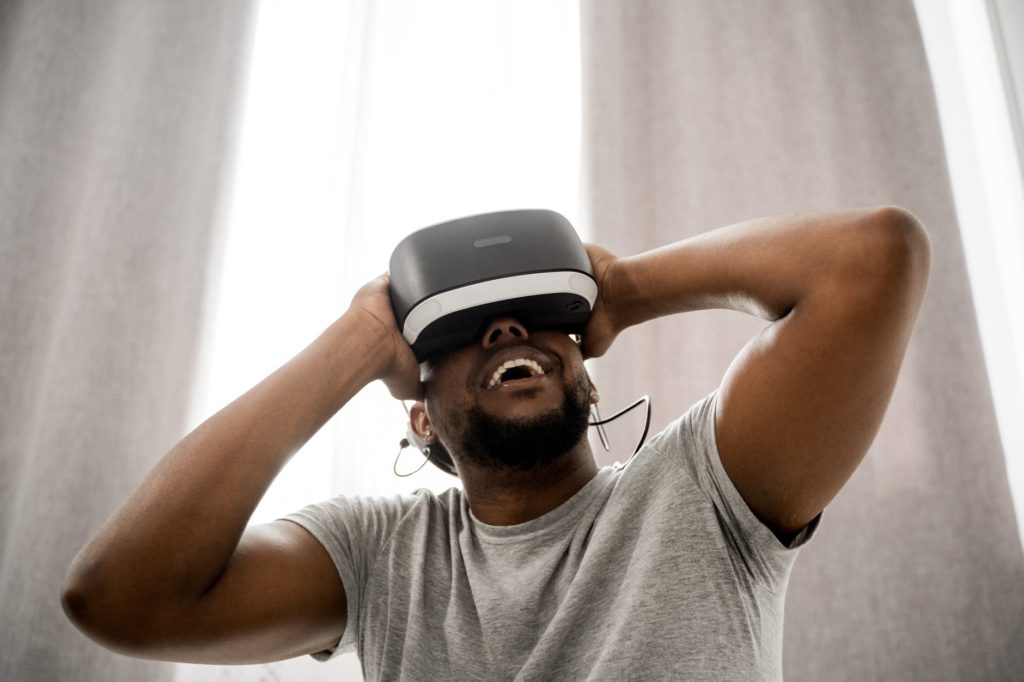
SOURCE: Pexels
Over the last decade, the way businesses provide, and users consume media and entertainment have drastically changed and evolved. The linear TV program has seen major declines in the number of customers while streaming video on demand (VoD) is taking its place. The trend is showing more personalization and immersion, creating unique experiences both in media and entertainment. With the rise of virtual reality (VR) and augmented reality (AR) the border between the real and digital worlds is blurring, while blockchain could change the media industry as we know it. These 3 technologies are currently forging the future of media and entertainment.
Post Contents
1. Virtual and augmented reality
Virtual and augmented reality have been gaining a lot of traction over the past years, slowly inching their way towards becoming a technology for the masses. With more and more VR headsets hitting the market at more affordable prices, the number of users has massively increased. People are looking for personalized and unique experiences that are truly their own, which VR and AR allow. 2017 the AR mobile game Pokémon GO became a massive hit worldwide, having people explore their cities anew to find the rarest of Pokémon and catch ‘em all.
This trend has been more visible as of late with more AR games such as Minecraft AR and Angry Birds AR being released, melting the border between the real and digital realms. While AR integrates virtual objects in the real world, VR lets users get fully immersed with all their senses. This has become more popular in the video game sector; however, other parts of the entertainment industry are also profiting. E.g., Altspace VR allows users to attend music events while interacting in the virtual realm – all without leaving their living room. These technologies are experiencing a lot of growth and will most likely become more mainstream in the future offering users truly immersive experiences.
2. Streaming and live streaming
Streaming is now the name of the game, while video on demand is changing the way people consume media. Subscription-based VoD services such as Netflix and Amazon Prime Video offer customers a wide range of movies, documentaries, and TV series to stream online whenever they please without having to stick to a schedule. The VoD segment is predicted to reach US$85,887m in 2021 with an annual growth rate of 10.17%. This shows the immense potential of this area changing the world of media tremendously.
Live streaming is also on the rise with more and more brands streaming on social media in real-time to interact with their customers. Meanwhile, the events and music industry has also been exploring the many benefits of live streaming. Concerts, shows, and even the silver screen are being broadcasted live for users to enjoy from the comfort of their homes. This has also expanded into more areas of the entertainment industry, with casinos streaming real dealers onto the screens of players to have a virtual real-life casino experience. There are many trusted online casinos, which have been reviewed by experts, streaming live dealer games such as baccarat, roulette, and even teen patti. Such immersive and real-life experiences are likely to gain more and more traction as users look for unique entertainment that they can enjoy from home.
5. Blockchain
Blockchain is another word that has been getting a lot of media attention worldwide – mostly with cryptocurrency. However, blockchain is so much more than bitcoin. It is even likely it could massively change the world of media and entertainment in the long run. Blockchain describes a specific kind of database, which allows to safely store data that cannot be changed. It’s also a decentralized system, which is not controlled by one entity or person but rather by all users collectively.
This decentralized system can be used in the entertainment industry and change how media is distributed. Blockchain allows creators and producers to eliminate the middleman and directly distribute their creations to the consumer. In the music and entertainment industry right now the middleman, such as streaming platforms and labels, is in charge of the distribution, taking a large chunk of the payment. With the help of blockchain to distribute directly to the consumer, this can be omitted for a revolutionized way of how creators get paid for their creations.
The world of media and entertainment as we know it is undergoing massive changes. Large technology trends such as VR, streaming, and blockchain are disrupting the way users consume media, forging the future of the industry.